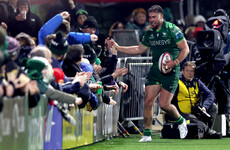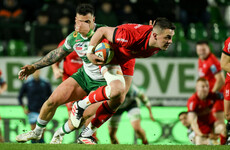FOR PROFESSIONAL RUGBY players, nutrition is serious business.
Food and liquids are the fuel for their performances and, much like the rest of us, sitting down to eat can be the highlight of their day. Good food, sleep, and internet are three core components of any happy camp.
So it makes sense that Ireland brought the two chefs who cook for them at the IRFU’s training centre in Dublin with them to France for the duration of the World Cup, as well as having their full-time nutritionist on the ground. These lads take some feeding.
“They just like food and lots of it,” is how Ireland’s nutritionist, Emma Gardner, puts it.
Gardner is the head of nutrition for the IRFU, leading a department of 11 other nutritionists across the Irish provinces and international teams, but she also works directly with Andy Farrell’s senior men’s team.
So she’s been busy at the World Cup, keeping a group of 33 large players – as well as the 30 Ireland staff – fed and watered.
A typical day of eating for the players involves breakfast, a mid-morning snack, lunch, a mid-afternoon snack, the evening meal, and a final pre-bedtime snack. Nutritional plans are individualised to match each player’s specific physical make-up and their needs.
“A lot of people assume they all eat the same, but it all depends on who is playing, what position they’re playing, and how many minutes they think they’ll play,” says Gardner.
She’s been in the role for a year, having spent six years with England Cricket prior to joining the IRFU. Gardner also worked with the Great Britain hockey team for two Olympic Games, while she started out in rugby 10 years ago with Northampton.
She has seen plenty of change in that decade.
“Working with these guys at international level, we all see week-in and week-out the physicality in how the game has developed and the type of game we play.
“Every collision creates a further energy demand. The time the ball is in play will influence the fueling strategies we do, so I think there’s a natural player buy-in because they feel it and experience it. They know what they need to do to fuel for 80 minutes.
“I say to them all the time, ‘How are we looking in the last 10 to 15 minutes of a game?’, because for me that’s where my area kicks in with them, and we never want to have an excuse where we aren’t winning a game because we’re under-fueled.
“One of the biggest things we’ve seen the difference in is our recovery, how much better they feel in a shorter space of time. If they start with a full fuel tank and only slightly deplete it, it’s easier to get them back to a baseline.
“That’s just not for performance, it’s also minimising injury risk, minimising illness. Some people just see nutrition as food but hopefully, my role spans way beyond that and hopefully, we see that in our results as well.”
There are very different shapes and sizes within Ireland’s squad, from the diminutive, fast-twitch scrum-half Craig Casey to the tall, hard-gaining lock James Ryan to the muscular, heavy Andrew Porter.
For someone like Porter, who is around 115kg and can play up to 75 minutes per game despite being a prop, the nutritional demands are huge.
“Often people want to know calories, but it depends on their bodyweight and other factors. He would be looking to eat 400 to 600 grams of carbohydrate [in a day]. If you think one plate of pasta might be 80 grams, we’re talking a huge amount,” says Gardner.
“Generally, all guidance around nutrition will be based on bodyweight, so it’s all individualised to what the player will be.
“For someone like Ports, who’s going to play high minutes, he’s fantastic, he does an amazing job with his nutrition and it’s very detailed to make sure he goes in fully fueled and able to play 80 minutes, should he need to.”
Gardner says that the vast majority of players’ nutritional demands are met through their meals and though they do use three or four supplements, Ireland are “actually pretty minimalistic” on that front.
She is clearly clued into everything within the Ireland set-up and it’s evident that Gardner’s work is not just a silo. Nutrition is a core part of the plan and blends in with everything else that’s important for a high-functioning rugby team.
Gardner’s experience of two Olympics, as well as being at the Cricket World Cup, is beneficial. She has come to appreciate the importance of athletes being able to go back-to-back-to-back-back with big games, as Ireland hope to do in the coming weeks.
“It’s a long tournament,” says Gardner. “There’s a long time to concentrate and keep players focused. I think a big learning for me is ‘food is mood,’ particularly in these campaigns.
“We obviously try to keep the quality good and of high quality all the time but there’ll be times where we go, ‘Let’s just calm it a bit’ and just give them what they want and relax because that’s also important when you’re here for such a long time.”
That’s why things like players having a few glasses of wine during their down days last week are all good.
“We don’t have rules, we have standards and the lads know those standards,” says Gardner. “They’re very professional, they also need to look after their own bodies.
“They know the time when they can slightly relax. They can do that with food, they can do that if they want to have a drink but they also understand what’s ahead of them.”
The 9pm kick-offs are a tricky reality for Ireland at this World Cup for many reasons, including nutrition.
“Sometimes the challenge is overeating, feeling sluggish because the only thing you do is eat all day so you have to tailor it and manipulate it to what they need,” says Gardner.
“We’ve done a lot of work in that space with individuals to make sure they feel good going into the game when it’s that late.”
And once the game is finished, the refuelling begins again immediately.
“Our recovery starts as soon as ideally they hit the bench, certainly when they hit the dressing room.
“I’m yet to find a rugby player who wants to sit down immediately after coming off a pitch and eat a full-on meal. For a lot of them, we look to fluids, we look to alternative methods to get calories back into them
“The other day [after the South Africa game], we got back to the hotel at 1am and they’d a post-match meal. They had to, there’s no other time.
“They’re very diligent, we prioritise eating and sleeping and we try and get them back to baseline as fast as we can for the next game the following week.”
The discipline and planning required to nail the nutritional side of things at this World Cup is impressive.
Now, where’s the boulangerie?















Napoli 4 points clear at the top as it stands. Good to see Juventus not running away with it for a change
@Jordo: Roma and lazio also both have a game in hand over here others at the top, so things could become very tight at the top. Napoli at home to Juventus in two weeks will be a big one, Inter also quietly going about their business. Shaping up to be most competitive serie A for a few years.
@Seamus Cummins: exactly
@Jordo: forza Roma